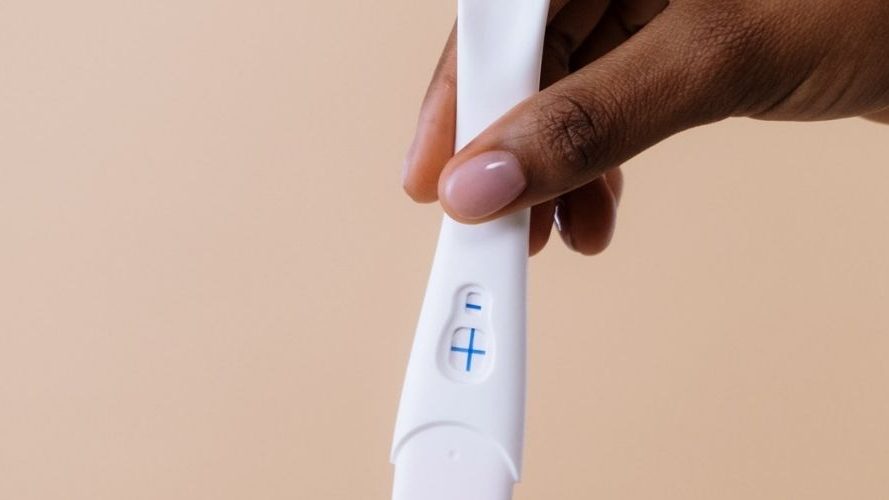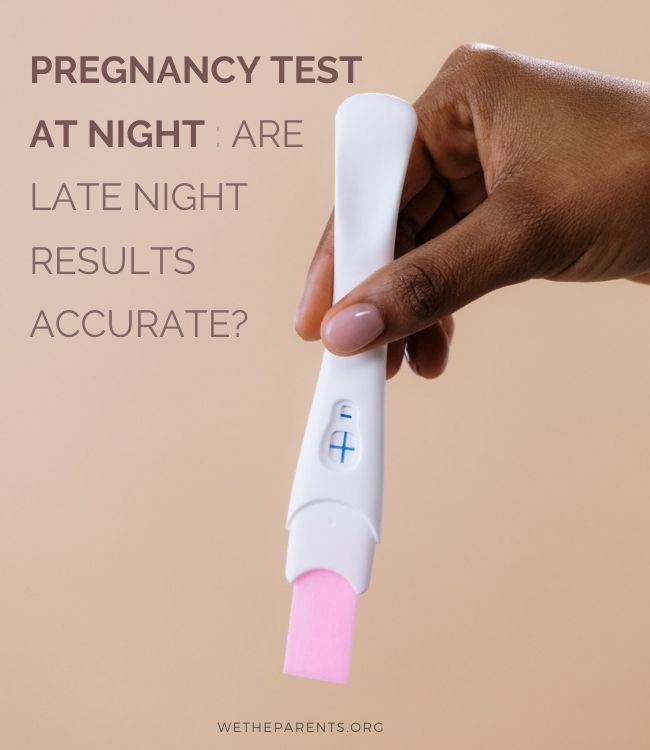You’re eager to take a pregnancy test, but you want to be sure you get the most reliable results possible. What you’re wondering most is whether it’s okay to take a test at night.
Don’t worry — in this article, we answer all of your most pressing pregnancy test timing questions.
In this article:
How home pregnancy tests work
Most home pregnancy tests consist of a stick that must be dipped into a container of urine or held under a stream of urine. These tests are designed to test pee for a hormone called Human chorionic gonadotropin (hCG).
Detectable levels of hCG are excreted by the placenta as early as the first week following implantation. 1Nepomnaschy, P. A., Weinberg, C. R., Wilcox, A. J., & Baird, D. D. (2008). Urinary hCG patterns during the week following implantation.Human reproduction, 23(2), 271-277.
PubMed.org However, it usually takes between 10 to 14 days for the hormone to be detected by a urine test.
hCG levels are highest during the first three months of pregnancy and then decline. Most home pregnancy tests detect hCG levels between 20 and 50 milliunits. 2When is the best time to take pregnancy test?
wexnermedical.osu.edu/blog/best-time-to-take-pregnancy-test
Many home pregnancy tests claim to be 99% accurate when taken after the time of the missed period, or about ten days after ovulation. However, not all women have regular periods.
Understanding hCG (Human chorionic gonadotropin)
According to the American Pregnancy Association, hCG levels less than 5 mIU/mL (milli-international units per milliliter) are deemed negative for pregnancy.
20mIU/hCG is the level of hCG that’s typically present in the urine of pregnant women at about seven to ten days past ovulation.
Meanwhile, they reach an all-time high between weeks 13 and 16. Since hCG levels vary so much, doctors rarely use them to estimate the date of conception.
When is the best time to take a pregnancy test?
Most medical professionals will advise you to wait until at least a day after your missed period to take a pregnancy test. You can decrease your chance of getting a false negative by taking a test first thing in the morning.
Urine contains the highest concentration of hCG first thing in the morning. hCG levels double every two days until the last days of the first trimester.3Doğramacı, E. J., & Rossi-Fedele, G. (2016). Establishing the association between nonnutritive sucking behavior and malocclusions: a systematic review and meta-analysis. Food and Drug Administration, Center for Devices and Radiological Health, 22.
fda.gov Other than a missed period, early signs of pregnancy include breast tenderness, nausea, fatigue, and increased urination.
However, these symptoms are not enough to confirm a positive pregnancy. If you believe you are pregnant, wait until you miss your period before taking a home pregnancy test.
How accurate are the results?
It’s difficult to dispute a positive pregnancy test. However, there could be reasons for you not to trust early results. When tests are taken too early, there is not always enough detectable hCG in a woman’s urine.
If you missed your period and believe you may have received a false negative, take a second test a week after your missed period.
Since hCG levels multiply rapidly during the first weeks of pregnancy, you can take a pregnancy test at any time of the day once you’re several weeks past your expected (and missed) ovulation period.
Most at-home pregnancy tests claim to be 99% accurate. However, many factors could hinder test results, including medications, ectopic pregnancies, miscarriages, test timing, and testing methods. 4How accurate are home pregnancy tests?
nhs.uk/common-health-questions/pregnancy/how-accurate-are-home-pregnancy-tests/
Ectopic pregnancies are pregnancies that grow outside of the uterus, usually in the fallopian tube, and are dangerous.
Any pain or history of pelvic inflammatory disease with a positive urine pregnancy test warrants an early ultrasound and a doctor’s visit.
What if you can’t take a test in the morning?
Sometimes a woman is unable or unwilling to wait until morning to take a pregnancy test.
If you insist on taking a pregnancy test before morning, try to generate first-thing-in-the-morning hCG levels by avoiding urination for several hours before taking the test.
Apart from this, avoid over-hydrating, as excess H2O is likely to reduce the amount of hCG in your urine.
Blood pregnancy tests
Serum tests are proven to be 99% accurate. More importantly, these tests can be taken at any time of the day. Moreover, they can be used even before a missed period.
However, you must visit a qualified medical practitioner to get a blood test. Most women only seek out blood tests after missed periods or positive home pregnancy test results.
Pregnancy test F.A.Q.
Here are some answers to the most frequently asked questions regarding at-home pregnancy tests.
Can I take a pregnancy test in the early morning hours?
If you’re too anxious to wait till your morning alarm goes off, you may be wondering if there is another way to recreate your first-thing-in-the-moring hCG concentrations.
Feel free to take a test in the early morning hours, or even during the day, if that’s when you typically rise from sleep. Just make sure to use the first urine that you eliminate after waking.
If you’re taking a pregnancy test at night, or very early in the morning, during early pregnancy, you might get a negative result.
Is that negative result certain?
There’s always a chance that not enough pregnancy hormone was detected, or you misestimated the date of your next anticipated period.
If you suspect the negative result is wrong, wait a few days before taking another one. Otherwise, reach out to your doctor.
What do I do if I get a positive result?
Once you receive a positive test result, you should talk to your doctor for advice on what to do next.
How accurate are pregnancy tests when taken at night?
hCG levels vary significantly throughout the day. hCG concentrations in a woman’s urine are usually the lowest at night.
This is because she has likely urinated and drunk liquids throughout the day. For this reason, tests taken at night seldom yield accurate results.
Wrapping up
When trying to conceive, the weeks leading up to (and following), a missed period can feel like a lifetime. You can optimize the timing of your pregnancy test to ensure that you don’t get a false negative.
Taking a pregnancy test at night is not 100% reliable during early pregnancy. If you’re not sure of your results, consider having your doctor take a blood test.









